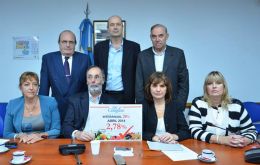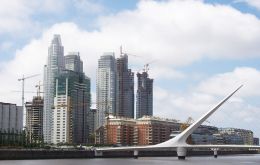MercoPress. South Atlantic News Agency
Tag: Indec index
-
Friday, May 23rd 2014 - 10:17 UTC
IMF to check Argentine new stats on inflation and GDP next month

The International Monetary Fund board has already received a first analytical report on Argentina latest statistics and will address the issue in its next meeting scheduled for 6 June, according to IMF spokesperson Gerry Rice in Washington.
-
Friday, May 16th 2014 - 10:06 UTC
Argentina's April inflation for the Congressional index reached 2.8%

Argentina's inflation congressional index marked 2.8% in April, or 15.78% in the first four months of the year and 39% in the last twelve. These percentages contrast with the official data from the Indec stats office which earlier this week said the April CPI was 1.8%.
-
Wednesday, May 14th 2014 - 00:24 UTC
Cristina Fernandez ally union admits 18.8% (7 million) of Argentines are under the poverty line

At least 7 million Argentines, or 18.8% of the population, currently find themselves under the poverty line, with 1.7 million (4.2%) classed as in extreme poverty or indigence, according to a new report from the Argentine Workers' Central (CTA) union headed by the Cristina Fernandez government ally Hugo Yasky.
-
Saturday, May 3rd 2014 - 06:06 UTC
Construction in Argentina down 6% in March; industry demands price stability

Argentina's National Statistics Bureau, Indec revealed that construction activity fell 6% in March compared with the same period in 2013. The Argentine government, as has happened with the poverty figures, at first was reluctant to release the index, but finally delivered the latest data.
-
Wednesday, April 30th 2014 - 08:57 UTC
Poverty in Argentina stands at 27.5% of population, says Catholic University

Poverty and indigence in Argentina in the last quarter of 2013 again increased and reached 27,5% of the population and 17.8% of households, according to the latest report from the Catholic University Social Debt Observatory, UCA.
-
Tuesday, April 29th 2014 - 06:31 UTC
Argentina and Brazil plan to prop economies by stimulating the auto industry

Argentine Economy Minister Axel Kicillof and Industry Minister Débora Giorgi fly to Brasilia on Tuesday in a bid to swing the automobile trade balance in Argentina’s favor, with the sector accounting for the majority of a total 3.15 billion dollars trade deficit. From Brazil Finance minister Guido Mantega confirmed bilateral discussions on the auto industry and exports.
-
Saturday, April 26th 2014 - 05:57 UTC
Argentina's industrial production and trade surplus falls point to recession

Argentina's industrial production contracted 6% in March from the same month last year, the government said on Friday, marking the sixth consecutive monthly loss in factory output due in part to weakness in the auto-making sector. In another report released on Friday Argentina's trade surplus contracted dramatically, indicating the country could be effectively heading for a recession.
-
Friday, April 25th 2014 - 05:56 UTC
Argentina's poverty index closer to “25% than to the official 5% from Indec”

Argentina's stats office, Indec failed on Wednesday to deliver the country's poverty and indigence rates due to “methodological” reasons, the head of ministers explained on Thursday morning adding the measurement of the basic basket “differs totally” from CPI’s calculations. His comments triggered a cataract of criticisms.
-
Thursday, April 24th 2014 - 07:35 UTC
Argentine government cancels releases on poverty and indigence

Argentina's Statistics and Census Institute (Indec) postponed the release of figures from the so-called House Poll, which includes strategic information regarding poverty and indigence rates, officials from that entity confirmed on Wednesday afternoon.
-
Friday, March 28th 2014 - 06:22 UTC
Argentine economy expands 3%, thus saving 3.5bn in payments to bonds tied to GDP

Argentina's National Institute of Statistics and Census, Indec, announced that the country's GDP grew by 3% across the last calendar year, dropping short of the figure necessary to service bonds linked to the nation's economic activity.
